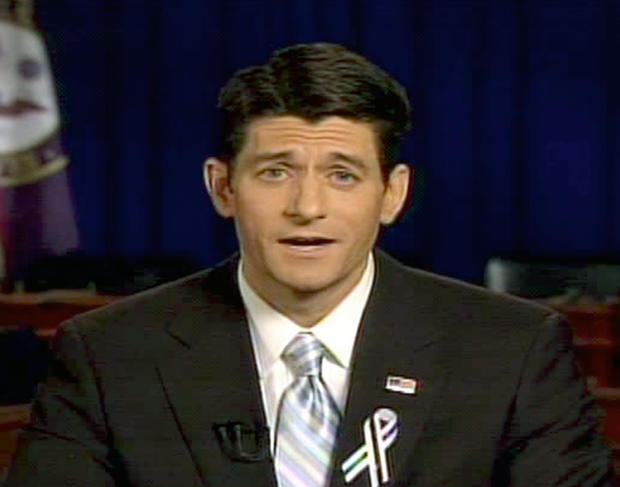How Washington Avoids an "Adult Conversation" on the Budget
This post originally appeared on Slate.
Politicians in Washington like to talk about talking about the budget deficit. They acknowledge it. They emphasize the importance of talking about it. They suggest they have strong feelings about it. But when it comes to details, they get vague. Not since Bill Clinton's second term has there been a topic people talk about so much without wanting to be specific.
On Wednesday, senior White House officials offered an example of this phenomenon. They held a briefing for reporters about the president's new energy initiative. Part of his "Win the Future" campaign, there were the requisite new slogans. The "Better Building Initiative" sets goals for improvements in energy efficiency. "Race to Green" offers grants to state and local governments that make it easier to retrofit buildings to install energy-saving technology. But when asked how much it would all cost, there were no numbers. The Wall Street Journal's Laura Meckler asked why, since the president's budget--which will be released in two weeks--has been completed. The senior administration officials should know exactly how much the initiatives cost. After all, they are senior.
There were three possible answers to her question: a) We are spending a lot and don't want criticism of how much we're spending to overshadow coverage of the president's exciting new initiative; b) We're spending very little and don't want the headline on the president's exciting new initiative to be "Big Whoop"; or c) We really don't know because we're making this up.
Meckler got d) No answer at all: "There's a lot of information in the budget. It will be out in due course. There'll be plenty of details about these proposals and lots of other proposals when the budget actually comes out." It was a phone briefing, but I imagined lots of waving of senior hands as this was being said.
This is typical, and just one of the ways to stay unspecific about how to reduce the deficit that this year is estimated to be $1.5 trillion. Here are some other ways, ranked in rough order from most embarrassing to most courageous:
Diet Tomorrow: Suggest new programs but don't say how you'll pay for them.
Blue Ribbon Duck: Call for a commission to study the deficit, or entitlement spending, or whatever it is about the budget you don't want to talk about.
Blue Ribbon Dodge: Call for a commission and when it offers suggestions, ignore them. (This is the president's present posture toward his deficit commission.)
Spinach Some Day: Declare that pruning entitlements is necessary but suggest no way to do so.
The Big Empty: Call for a balanced budget amendment or a spending cap, with no specifics about how to implement either.
Fear: Say that any spending reductions beyond those you like will shut down the government.
Lafferable: Declaring that the budget must be shrunk by spending cuts alone.
Fish Story: Boast about tiny cuts that address only a fraction of the problem.
Young Adult: Support a tough deficit commission report even though you don't like some provisions. Sens. Dick Durbin and Tom Coburn did this.
There is one man who likes to get specific about spending cuts. Rep. Paul Ryan, the House budget chairman, is the Kenneth Starr of budgets: When he gets specific about the deficit, even his allies wince. He's got a deficit reduction plan that few of his Republican colleagues will sign on to. The cuts are too big and the changes to programs like Medicare and Social Security are too politically potent. Democrats won't sign on because he doesn't account for lost revenue from tax cuts. (See above under Lafferable.)
On Thursday, Ryan introduced a smaller version that he says is just the start of a programmatic attack on federal spending. He proposed a $74 billion discretionary reduction for this spending year, the largest single year cut in decades. It included a $16 billion cut in defense spending that Majority Leader Eric Cantor had been telegraphing for weeks.
Ryan has company in his specificity. There are several bipartisan groups of lawmakers. My colleague David Weigel writes about Sens. Claire McCaskill and Bob Corker. Sens. Mark Warner and Saxby Chambliss are also trying to work out budget deficit proposals. There are even hints that the White House is trying to work out a quiet deal on entitlements with Republicans like the secret one they hatched with Minority Leader Mitch McConnell on continuing the Bush tax cuts.
In two weeks the president will offer his own budget, making the conversation more specific. Gauzy deficit talk will continue, of course. But it may turn out to be a lot like the deficit itself: In a few months, we might see a net reduction.
More from Slate:
Do the Egyptian protests prove George W. Bush right?
Are House Republicans becoming more popular because they aren't doing anything?
Why Israel hates the Egyptian uprising.
John Dickerson is a CBS News political analyst. He is also Slate's chief political correspondent and author of On Her Trail. You can also follow him on Twitter here.


